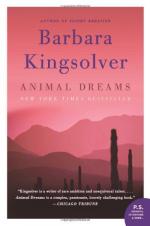|
This section contains 613 words (approx. 3 pages at 300 words per page) |

|
SOURCE: “Call of the Eco-Feminist,” in Time, September 24, 1990, p. 87.
In the following review, Gray offers positive assessment of Animal Dreams.
Though routinely maligned as a decade of swinish greed, the 1980s also produced a kinder, gentler brand of storytelling, one that might be described as “eco-feminist” fiction. The central plot of this evolving subgenre has become reasonably clear. Women, relying on intuition and one another, mobilize to save the planet, or their immediate neighborhoods, from the ravages—war, pollution, racism, etc.—wrought by white males. This reformation of human nature usually entails the adoption of older, often Native American, ways. Ursula K. Le Guin's Always Coming Home (1985), an immense novel disguised as an anthropological treatise, contains nearly all the quintessential elements, but significant contributions to the new form have also been made by, among others, Louise Erdrich and Alice Walker.
Now comes Barbara Kingsolver, whose second novel, Animal...
|
This section contains 613 words (approx. 3 pages at 300 words per page) |

|


